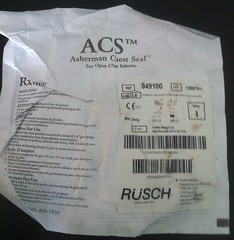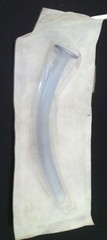The last couple posts have been about how to stop bleeding. Today I want to talk about some of the more specialized equipment in my emergency first aid kit (blowout kit).

The Gerber Multi pliers are just for anything, but the medical reason is to cut things off that are sticking out. Hard to think about but, sometimes something gets stuck in someone that needs attention. If you aren’t in a hospital, you really don’t want to pull it out. Wait and have the pros do that, but it may be stuck to something else, or sticking out a couple feet. The multi pliers are nice if I have to cut something off so I can transport someone.
The super glue I used overseas for small cuts. Yes it may scare, but that is better then getting some crazy disease or infection. It can also be used for deeper cuts that would generally need stitches. The sharpie is for writing notes on people like when you put a tourniquet on.
I also carry some specialized gear that needs some advanced training to use. I suggest you think about getting some advanced training. I carry an Asherman chest seal. It’s designed for a sucking chest wound. A sucking chest wound is a puncture to the chest that is allowing air to enter through the wound. It makes a sucking or gurgling sound so it’s normally easy to identify. The problem is that air coming into the chest cavity will collapse the lung and could cause death. This is a bandage designed to seal the hole and put a one-way valve in to let air out, but not in. I was first taught to make one of these with duct tape and an MRE wrapper. It took time and was hard to get right. Medics I talked to that have used one of these say they work great, and are surprisingly easy to use.

I was also trained to decompress a tension pneumothorax in boot camp. It is about the scariest thing out there. A tension pneumothorax is when air enters the chest cavity between the long and the chest wall. The air builds up and can collapse both lungs eventually killing the person. At first I was taught to push a pen into the chest under the person’s armpit. Now I have a nice needle to use and my training has advanced so now I would push the needle into the chest one rib above the nipple (don’t try this without advanced training). A medic that I knew said it was the scariest thing he had ever done. But that’s why I carry a needle in my kit. There use to be a couple web sites to buy the needles from, but they have all taken them off their sites.

Both of those things are for chest injuries. The last thing I carry is a Nasopharyngeal Airway. This is literally a tube that you shove up someone’s nose to allow them to breath if their jaw and mouth is destroyed and the person can’t breath. This one can be learned pretty easily and can save a life. A person can die in 3 minutes without air and the normal response time for a medic is 5 minutes.

My kit was designed from knowledge of battlefield medicine and what I can do. The number one cause of death on the battlefield is by far blood loss. Second are chest and lung injuries, and a close third is suffocating after a face injury. If you are going to build a blowout kit and get some knowledge, start around these three things.
Stay Safe,
Ben
So I am a medic, and have a few comments to make on this…first of all, it is great that you’re carrying this sort of stuff. Kits like these have saved countless victims because, as you note, the average response time is something like 5 minutes—and a lot of these conditions can kill in less time. Based on my experience, you really should add a tourniquet to this list. I’ve seen more lives saved by bystanders using a tourniquet then any other intervention. Quickclot is also a great thing to add.
The Asherman chest seal is great, but almost no one is using them anymore. The HALO and HyFin chest seals both work much better because they are far stickier (and trust me, with a chest covered in dirt and blood, you want as sticky as you can get.
A chest needle is an interesting choice. The 14ga IV catheter you show here might work, but more than likely won’t be long enough. We use the ARS needle, which you can get at Chinook Medical. Just be careful to know what you’re doing—you can cause a lot of damage if you don’t know or if you stick a needle in someone who doesn’t need it. It is pretty rare to need to “dart” someone’s chest.
With the NPA, that’s something we use ALL the time. It is very easy for the tongue and jaw to occlude the airway, and an NPA can keep things open (often better than an OPA, which can trigger the gag reflex). However, you have to be careful putting them in on facial or jaw injuries, because if the skull is fractured (on the inside, behind the nose) you can end up putting the NPA right into the brain. Not good.
One more note—the multitool is worthless. It is almost never a good idea to remove an impaled object, and if it is big enough to remove, you’ll need much bigger tools. A better addition would be a pair of trauma shears to aid in getting clothes off.
Thanks for the info. I’m looking to replace the Chest Seal. The newest thing I’ve heard is that we are getting away from the entire venting of a sucking chest wound and just putting a seal over it. If the pressure gets too much, then do a decompression. But it’s the gear I’ve got right now and know how to use. It’s been a couple years since my last medical training, sounds like it’s time for me to take another course.
Great topic. If more people understood basic first aid we would loose less people to car accidents and accidents in general. Combat medics are the best of the best, I hope you can get a few to share some insight. All my time outside the wire and I know my guys felt the same way, “you always know what vehicle your Doc is in” LOL
Yep, always know where the doc is. I do remember that, and I also always knew where his bag was.
That is an intense topic. I have a lot of respect for battlefield medics. Have you thought about an interview with a battlefield medic? How they handle the stress? What is the common injury they have dealt with?
This is kind of on the dark side, but I used to work with a guy that was medic on the front lines. I asked him how he psychological handled it. He said to me, “You just have to know your already dead.” That statement blow me away, but he seemed put together and level.
That’s a great idea! I’ll try and track some of my old docs down and see if I can get some info from them for you.
All of us are a little twisted after coming back from combat, some more then others. Hopefully your friend has come to terms with his demands.